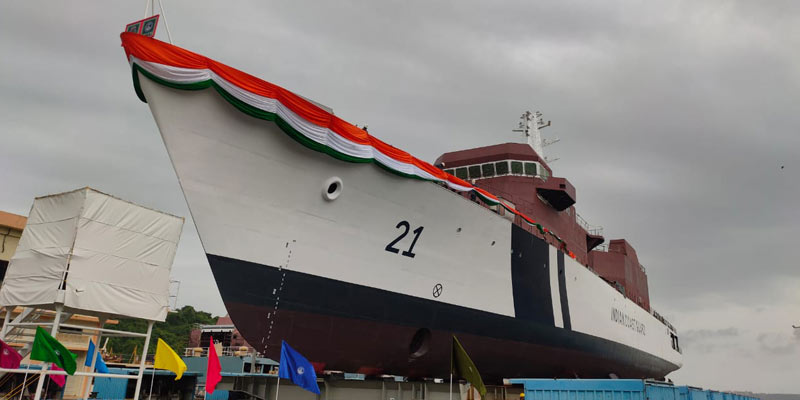- India
- Aug 14
Coast Guard’s offshore patrol vessel Sarthak launched
An offshore patrol vessel (OPV) for the Indian Coast Guard was launched and rechristened as Sarthak.
Main features of the ship:
• OPV Sarthak is fourth in the series of five OPVs. It has been designed and built indigenously by Goa Shipyard Limited (GSL)
• The ship is fitted with state-of-the-art navigation and communication equipment, sensor and machinery.
• The 105 metre ship displaces approximately 2,350 tonnes and is propelled by two 9100 KW diesel engines designed to attain a maximum speed of 26 knots, with an endurance of 6,000 Nautical Miles.
• The sustenance and reach, coupled with the latest equipment and system, provides the capability to perform the role of a command platform and undertake tasks to fulfill the Coast Guard charter.
• The ship is designed to embark and carry a twin-engine helicopter, four high speed boats and one inflatable boat for swift boarding and Search & Rescue operations.
• The ship is also capable of carrying limited pollution response equipment to undertake oil spill pollution response at sea.
• It has about 70 per cent indigenous components, thus providing the necessary fillip to the Indian shipbuilding industry and a giant leap towards achieving ‘Atmanirbar Bharat’.
• The ship will be deployed extensively for Exclusive Economic Zone (EEZ) surveillance, coastal security and other duties as enshrined in the Coast Guard charter of duties.
• In addition to the OPV project, 52 ships are at various stages of construction and 16 Advanced Light Helicopters are under production at HAL, Bengaluru, which will provide the added strength to the surveillance capabilities of Indian Coast Guard to deal with the dynamic maritime challenges.
Indian Coast Guard
Indian Navy has been designated as the authority responsible for overall maritime security including coastal and offshore security. Indian Navy is assisted by Indian Coast Guard (ICG), Coastal Police and other central and state agencies.
Indian Coast Guard was formally launched in 1978. A charter of duties is laid down in Coast Guard Act, 1978.
ICG is also designated as an authority responsible for coastal security in Territorial Waters including areas to be patrolled by Coastal Police. The Director General of ICG has been designated as Commander Coastal Command and is responsible for overall coordination between central and state agencies in all matters relating to coastal security.
ICG is a multi-mission organisation, conducting round-the-year operations at sea. Despite being relatively small, it has a wide range of task capabilities for both surface and air operations.
The Coast Guard Headquarters (CGHQ) is located in New Delhi. For effective command and control, the maritime zones of India are divided into five Coast Guard regions — North-West, West, East, North-East and Andaman & Nicobar, with the respective regional headquarters located at Gandhinagar, Mumbai, Chennai, Kolkata and Port Blair.
Duties of Indian Coast Guard include:
* Ensure safety and protection of artificial islands, offshore terminals and other installations.
* Protection and assistance to fishermen and mariners at sea.
* Preservation and protection of marine ecology and environment including pollution control.
* Assistance to the Department of Customs and other authorities in anti-smuggling operations.
* Law enforcement in territorial as well as international waters.
* Scientific data collection and support.
* National defence during hostilities (under the operational control of the Indian Navy).
True to its motto “Vayam Rakshamah” meaning “We Protect”, Indian Coast Guard has to its credit of saving about 9,730 lives at sea, 12,500 lives as part of assistance rendered to civil authorities and undertook 400 medical evacuations. Indian Coast Guard saves one life every second day at sea.
The deterrence created by the Indian Coast Guard is not limited to the Indian waters, but collaboration with friendly littoral states as per provisions of bilateral cooperation agreements resulted in successful apprehension and seizure of drugs in Indian Ocean Region (IOR). The real time information sharing, close coordination and understanding between ICG and other international agencies has been the key success of these operations. The hawk eye vigil by the Indian Coast Guard of the Indian Exclusive Economic Zone (EEZ) has ensured seizure of contraband worth Rs 6,800 crore.

